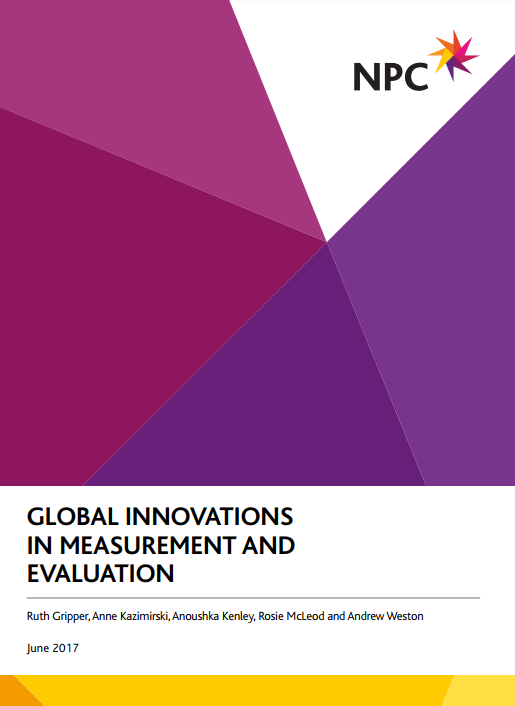Donors and investors are uniquely well placed to support good practice in the social sector, including in measurement and evaluation (M&E). As New Philanthropy Capital (NPC) explored in our recent report highlighting global innovations in measurement and evaluation, new technologies, changing philosophies and new entrants in this sector all play a part in driving changes in evaluation practice.
How can funders make sure social purpose organisations—of all shapes and sizes—get the most from these latest developments?
First of all, ask the right questions.
While NPC strongly advocates the benefit of M&E for charities’ own learning and improvement, many still see it as donor-driven. That puts donors in a strong position to promote good practice.
As one major UK grant-maker said at the report launch, it isn’t funders’ role to dictate what charities should or shouldn’t be doing.
Rather, they can help charities figure out what is important and relevant to them, and provide support to follow up. Instead of backing one fancy evaluation tool or another, donors should make sure the basics are in place: clear, meaningful research questions which reflect existing evidence and appropriate methods.
Second, encourage collaboration—through offering resources and/or making use of relationships and convening power.
This might look like donors and investors funding an evaluation on condition that it be published so that others can learn from the findings, or putting organisations in touch with others working on similar issues so they can combine forces.
Shared measurement approaches, one of the innovations highlighted in the report, require good relationships and some investment to get started. An engaged and supportive funder can make a big difference in achieving this.
Collaboration is also essential for successful data linkage, another development we identify in the report. Blackpool Better Start sought to link datasets held by different organisations and government agencies, to determine which interventions are most effective in improving the health and wellbeing of preschool children in the area.
Reaching agreement about data linkage is never easy, even when you have a history of working together. The prospect of £45m from the Big Lottery Fund if they could pull it off, and the constructive role the Fund played in helping to drive forward the conversations, made a big difference.
Next, back your interest with financial resources.
Putting money behind an issue can really help, and we see many examples of funders backing their commitment to good practice in M&E with financial resources. This gives organisations the extra capacity—and added incentive—to improve their evaluation practice.
In the UK the Access Foundation is funding a capacity-building programme to help organisations improve their impact management; elsewhere, the Fund for Shared Insight offers funding for organisations to improve the way they listen to users, while the Hewlett Foundation has a significant grant-making programme supporting organisations that help policy-makers find and use high-quality evidence in their decisions.
Finally, don’t leave it to others.
Funders can do this work themselves, too. For instance, just as charities are increasingly seeing service users (rather than funders) as key stakeholders in evaluation, so too some funders are seeking to learn from their grantees’ experience to improve their own practice.
In the UK, the Esmée Fairbairn foundation has taken up the Peery Foundation’s Funder Feedback tool to get instant feedback—again, reflecting the move towards learning from data in real time. The foundation recently published its first Insights report, sharing what they learned from seeking grantees and how they have incorporated the lessons into their work. Or, for example, consider how funders linking their data with others could help our understanding of issues and approaches.
Evaluation does not have to be expensive, but it does take a certain level of financial resources to invest in the tools, talent and skills required, which are appropriate to the organisation’s size and circumstances.
Many organisations struggle to embed good evaluation practice because their funding is too little, and too restricted.
Donors and investors can match their expectations with resources in order to help make sure evaluation is realising its potential to improve the social sector.
Ruth Gripper is a Consultant with New Philanthropy Capital (NPC).





Comments (0)